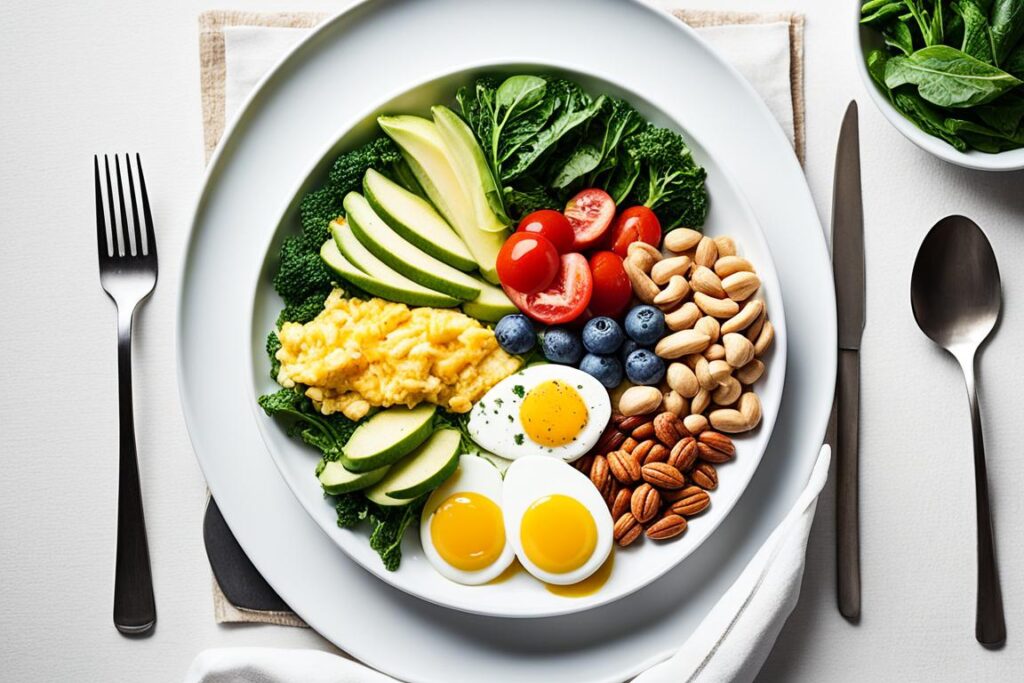Have you ever noticed how some people seem to eat a lot but don’t gain weight? Others try hard to lose weight but can’t. The answer might be in the metabolism. Metabolism is how your body changes food into energy. It affects your weight and how energetic you feel. So, what can you do to speed up your metabolism? And are there supplements that can help?
It’s important to understand what affects your metabolic rate. This will help you burn more calories, even when resting. Your basal metabolic rate (BMR) plays a big part. Factors like age, body composition, and health affect it. If you want to lose weight or feel more energetic, using proven methods can boost your metabolism.
Key Takeaways
- Your metabolic rate affects how efficiently your body uses calories.
- Eating protein requires 20-30% of its energy for metabolism.
- Regular exercise, including lifting weights, can help increase metabolism.
- Drinking green tea or oolong tea may boost fat burning when paired with exercise.
- Adequate sleep is essential for optimal metabolic regulation.
Understanding Metabolism: The Basics
Metabolism includes the processes that change food nutrients into energy. These are vital for energy, growth, and fixing cells. Knowing about metabolism helps you improve it with exercises.
What is Metabolism?
Metabolism is about the body’s chemical reactions that keep you going. It turns what you eat and drink into energy. This energy powers everything from breathing to moving. It involves building up cell parts and breaking down molecules for energy.
Factors Affecting Metabolism
Several things can change your metabolic rate, including:
- Muscle Mass: More muscle means a faster metabolism.
- Age: As you get older, your metabolism can slow down, often because you lose muscle.
- Gender: Men usually have a quicker metabolism because they have less body fat and more muscle than women.
- Physical Activity: Being active, like doing aerobic and strength exercises, boosts your metabolism.
- Body Size: Bigger people usually have a faster metabolism.
- Environmental Temperature: Your body uses more calories to stay warm or cool down, affecting metabolism.
- Hormonal Health: Hormone issues, such as hypothyroidism, can reduce your metabolic rate.
Basal Metabolic Rate (BMR)
The Basal Metabolic Rate (BMR) is how many calories you need to keep your body running at rest. It accounts for 50–75% of the calories you burn daily. Muscle mass, age, gender, and body size can all influence your BMR. For instance:
| Factor | Impact on BMR |
|---|---|
| Muscle Mass | More muscle leads to a higher BMR. |
| Age | As you age and lose muscle, your BMR goes down. |
| Gender | Men generally have a higher BMR than women. |
| Body Size | Bigger bodies need more energy, raising the BMR. |
To keep or increase your BMR, try exercises that boost metabolism. Also, for a fast metabolism, stay active and build muscle with strength training.
Importance of Protein-Rich Diet

Eating more protein can change your metabolism and help with weight management and overall health. Let’s look at two key points: the Thermic Effect of Food (TEK) and how protein boosts your metabolism.
Thermic Effect of Food (TEF)
The Thermic Effect of Food (TEF) is about the extra calories your body uses to digest food. Protein has the highest TEF, using up about 20-30% of its calories during digestion. This is much higher than the 0-3% for fats and 5-10% for carbs.
Eating protein-rich foods can increase your metabolism. This helps you burn more calories all day.
Benefits of Protein for Metabolism
Protein is key for keeping muscle mass during weight loss, which keeps your metabolism high. Muscle uses more calories than fat. So, it’s important to keep or grow muscle for good weight management.
Research shows that a high-protein diet has many benefits. For those overweight, high protein can reduce muscle loss during dieting. This keeps your metabolism strong. Also, high-protein diets can raise daily calories burned by 70 to 200. These diets can make you eat less by reducing hunger and cravings.
| Protein Intake (% of Daily Calories) | Calories Burned |
|---|---|
| 15% | 70 calories |
| 30% | 200 calories |
Eating more protein also has more benefits like better bone health, lower blood pressure, less hunger, and more muscle strength. To add more protein to your diet, try meat, fish, tofu, beans, cheese, and Greek yogurt. You can also add protein powder to meals and drinks. For more ideas on boosting your metabolism, talk to a doctor or a dietitian, especially if you have kidney concerns.
High-Intensity Interval Training (HIIT)
High-Intensity Interval Training (HIIT) is a great way to boost metabolism. It uses short, intense bursts of exercise followed by rest. This mix is powerful for metabolic benefits. Let’s explore how it works.
HIIT has a big impact on metabolism. In a study with eight men, five weeks of intense cycling made many changes in their bodies. They cycled hard for four minutes and then rested for two minutes, three times a week. This led to changes in 3,168 proteins in their thigh muscles.
- An increase in proteins that build mitochondria, responsible for energy production in cells.
- Heightened acetylation of mitochondrial proteins and enzymes crucial for cellular energy production.
- Changes in the proteins that affect skeletal muscle calcium sensitivity, essential for muscle contractions.
HIIT boosts metabolism not just by burning calories. It also causes the body to burn more calories after exercising. This is due to the Excess Post-Exercise Oxygen Consumption (EPOC) effect.
Medical studies show that HIIT improves fitness in just four weeks. HIIT also boosts human growth hormone by up to 450% after a workout. This helps with muscle building and fat loss. Here are the benefits of HIIT:
| Benefits of HIIT | Explanation |
|---|---|
| Increased Calorie Burn | HIIT can burn 25-30% more calories than other exercises in the same time. |
| Improved Metabolic Rate | HIIT raises your metabolism for hours after exercise. This increases fat burning. |
| Reduced Body Fat | HIIT effectively reduces body fat and waist size, with less training time. |
| Enhancing Oxygen Consumption | HIIT boosts oxygen consumption by 9-25%, similar to traditional training but quicker. |
| Decreased Heart Rate and Blood Pressure | HIIT can lower heart rate and blood pressure, especially in those overweight. |
| Improved Insulin Sensitivity | HIIT lowers blood sugar and improves insulin resistance. It helps everyone, even without diabetes. |
HIIT is a top exercise for boosting metabolism. It offers immediate and lasting benefits. The afterburn effect and increased HGH production make it excellent for metabolism. It aids in weight loss and muscle gain.
How Strength Training Can Boost Metabolism

Strength training is great for boosting your metabolism. It increases muscle, which burns more calories than fat. For example, one pound of muscle uses about six calories each day when resting. This is more than fat, which uses two calories. Adding weightlifting and resistance exercises to your routine helps increase your resting metabolism. This means you burn more calories and fat all the time.
Strength training has a unique benefit. It keeps burning calories even after your workout ends. Studies show it burns more calories post-workout than cardio. A 170-pound person can burn 462 calories with an hour of intense weight training. Someone who weighs 120 pounds burns 326 calories in the same time. Even with lighter weights, you still burn a lot of calories. It’s 231 calories for a 170-pound person and 163 for a 120-pound person in an hour.
To get the most from strength training, try various exercises. This includes:
- Strength endurance training: Do at least 12 reps with a weight that’s 67% of your one-repetition maximum (1RM) or less.
- Hypertrophy training: Perform 6 to 12 reps with 67-85% of your 1RM.
- Maximum strength training: Conduct fewer than six reps with 85% or more of your 1RM.
- Power training: This typically includes very few reps using 80-90% of your 1RM.
Strength training also has other big benefits. It keeps muscle mass during weight loss, which helps burn calories even when you’re not moving. It also reduces injury risk by strengthening muscles around your joints. Plus, it boosts heart health by improving circulation.
Here’s a breakdown of different weight training types and their effects:
| Training Type | Weight (% of 1RM) | Reps | Calories Burned (170 lbs) | Calories Burned (120 lbs) |
|---|---|---|---|---|
| Intense Weight Training | Varies | Varies | 462 | 326 |
| Moderate-Intensity Weight Training | Varies | Varies | 231 | 163 |
| Strength Endurance Training | ≤67% | ≥12 | Variable | Variable |
| Hypertrophy Training | 67-85% | 6-12 | Variable | Variable |
| Maximum Strength Training | ≥85% | Variable | Variable | |
| Power Training | 80-90% | Few | Variable | Variable |
NEAT (non-exercise activity thermogenesis) is also key for metabolism. It’s about the calories you burn doing everyday activities. Things like walking, fidgeting, and chores burn calories. For active people, NEAT can be half of their total calorie burn. This shows why being active all day is so important.
Strength training is one of the top ways to boost your metabolism. It leads to more calories burned, better heart health, and improved self-esteem. By building muscle, you’re setting up for long-term health, not just a quick fix.
How Can I Speed Up My Metabolism?

Boosting your metabolism is easier than you think. Just add some key habits to your day-to-day life. Focus on exercising regularly and eating your meals at the right time. These steps can make a big difference in your metabolism.
Regular Exercise and Physical Activity
Regular workouts are key to a faster metabolism. Try strength training and high-intensity workouts for the best results. Muscle mass burns more calories than fat, raising your metabolism. Studies from 2019 show that lifting weights improves your metabolic rate.
A 2021 study found that 15 minutes of intense training boosts your metabolism too. Plus, staying active all day matters. A study from 2018 showed that standing or walking can help your heart and metabolism. Combining exercise with foods that boost metabolism is a great plan for better health.
Optimizing Meal Timing
When you eat matters for your metabolism. Eating breakfast every day can speed it up, a 2021 study says. Start your day with protein to burn more energy. Choosing protein over carbs can also help burn more calories during digestion.
Avoid eating too late in the day. It’s better to eat at regular times and not skip meals. Avoiding late meals and eating breakfast regularly aids in weight loss, a 2021 finding suggests. Be careful with metabolism-boosting supplements, as their long-term effects are uncertain.
Making time for exercise and eating at the right times can really help speed up your metabolism. It creates the perfect setting for your body to work better and faster.
Metabolism-Boosting Foods and Drinks
Certain foods and drinks can greatly boost your metabolism. Including them in your diet helps with weight loss and health.
Green Tea and Oolong Tea
Green tea and oolong tea boost metabolism. They have catechins and caffeine which help burn fat. Drinking them regularly can increase your metabolism.
Spicy Foods
Spicy foods, like those with capsaicin, raise your metabolism. Capsaicin is in cayenne pepper and chili peppers. It raises body temperature and helps burn calories.
Water and Hydration
Water is key for a good metabolism. Staying hydrated is essential. Drinking enough water helps control appetite and aids in weight loss.
The American Heart Association suggests a way to monitor water intake. They advise drinking an ounce of water for every two pounds of your weight. Cold water can also boost calorie burning as your body heats it to body temperature.
| Food/Drink | Metabolism-Boosting Component | Benefits |
|---|---|---|
| Green Tea | Catechins | Fat oxidation, Enhanced metabolic rate |
| Oolong Tea | Caffeine and Catechins | Converts stored fat to fatty acids, Increases energy expenditure |
| Spicy Foods | Capsaicin | Thermogenic effect, Promotes calorie burning |
| Water | Essential Hydration | Improves metabolism, Suppresses appetite |
The Role of Sleep in Metabolic Health
Adequate sleep is key for metabolic health. Studies show not sleeping enough leads to metabolic problems and weight gain. Good sleep habits are among the best tips for a fast metabolism.
Sleep loss raises cortisol levels, affecting hunger hormones like ghrelin and leptin. Men sleeping only four hours have more ghrelin and less leptin. This could mean more snacking and weight gain.
Not sleeping enough can lower your basal metabolic rate. It does this by reducing certain activities in the brain. It can also mess with your hormone levels, making it hard to keep a healthy weight. Proper sleep habits, like a regular bedtime and sleeping in a dark room, help boost your metabolism.
Studies find that adults sleeping less than six hours are often more overweight. While we don’t know all the reasons yet, it’s clear that sleeping enough is crucial. Bad sleep can lead to serious health issues and make it tough to manage your weight.
Good sleep habits are important for keeping up your metabolism and helping with weight loss. With the right diet and exercise, getting enough sleep is a powerful way to boost your metabolism.
| Sleep Duration | Impact on Ghrelin (Hunger Hormone) | Impact on Leptin (Satiety Hormone) | Effects on Metabolism |
|---|---|---|---|
| 4 Hours | Increased | Decreased | Increased Appetite, Weight Gain |
| 10 Hours | Decreased | Increased | Reduced Appetite, Weight Maintenance |
To sum up, making sleep a priority is one of the smart tips for a fast metabolism. Improving your sleep can greatly help your hormones, appetite, and how well your body uses energy.
Conclusion
To boost your metabolism, you need to cover all bases. This includes high-intensity workouts and focusing on proteins in your diet. Your metabolism is based on different factors. These include how much muscle you have and your age. To improve, adjust your lifestyle to fit these facts.
The 2020-2025 Dietary Guidelines for Americans offer a tip. They say to cut 500 to 750 calories a day for steady weight loss. You should also move more, adding at least 30 minutes of activity per day. This isn’t just for losing weight but also to burn calories without working out.
Don’t overlook the power of good sleep and staying hydrated. Be careful with metabolism-boosting supplements. They might not work and can be unsafe. A better choice is natural options like green tea, oolong tea, and spicy food. With these habits and a personal touch, you can boost your metabolism. This helps with weight control and increasing your energy.
FAQ
Q: How can I speed up my metabolism?
Q: What is metabolism?
Q: What factors affect metabolism?
Q: What is Basal Metabolic Rate (BMR)?
Q: How can a protein-rich diet benefit my metabolism?
Q: What is the Thermic Effect of Food (TEF)?
Q: How can High-Intensity Interval Training (HIIT) boost my metabolism?
Q: How does strength training affect metabolism?
Q: How can I optimize meal timing to boost my metabolism?
Q: What are some metabolism-boosting foods and drinks?
Q: How does sleep impact metabolic health?
Source Links
- https://www.healthline.com/nutrition/10-ways-to-boost-metabolism
- https://www.medicalnewstoday.com/articles/323328
- https://www.webmd.com/fitness-exercise/what-is-metabolism
- https://www.mayoclinic.org/healthy-lifestyle/weight-loss/in-depth/metabolism/art-20046508
- https://www.healthline.com/nutrition/get-a-fast-metabolism
- https://beltlinehealth.com/6-tips-to-speed-up-your-metabolism-naturally/
- https://www.health.com/ways-protein-can-help-you-lose-weight-7562625
- https://www.healthline.com/nutrition/10-reasons-to-eat-more-protein
- https://www.healthline.com/nutrition/how-protein-can-help-you-lose-weight
- https://www.sciencedaily.com/releases/2022/05/220531151946.htm
- https://fitbodybootcamp.com/blog/how-do-hiit-workouts-affect-metabolism/
- https://www.healthline.com/nutrition/benefits-of-hiit
- https://www.nike.com/a/strength-training-benefits-metabolism
- https://www.tomsguide.com/news/can-strength-training-boost-your-metabolism
- https://www.self.com/story/how-much-does-strength-training-really-increase-metabolism
- https://www.unitypoint.org/news-and-articles/how-to-speed-up-your-metabolism-naturally
- https://www.forbes.com/health/weight-loss/how-to-increase-metabolism/
- https://www.medicinenet.com/can_eating_more_speed_up_your_metabolism/article.htm
- https://www.unitypoint.org/news-and-articles/12-metabolism-boosting-foods-to-aid-weight-loss
- https://www.prevention.com/food-nutrition/healthy-eating/g20504581/18-metabolism-boosting-foods/
- https://www.webmd.com/diet/ss/slideshow-foods-to-eat-that-help-your-metabolism
- https://www.ncbi.nlm.nih.gov/pmc/articles/PMC2929498/
- https://www.sleepfoundation.org/physical-health/weight-loss-and-sleep
- https://theconversation.com/what-can-you-do-to-speed-up-your-metabolism-204811
- https://www.mayoclinic.org/healthy-lifestyle/weight-loss/in-depth/metabolism/art-20046508